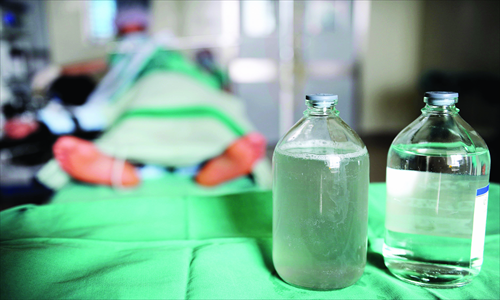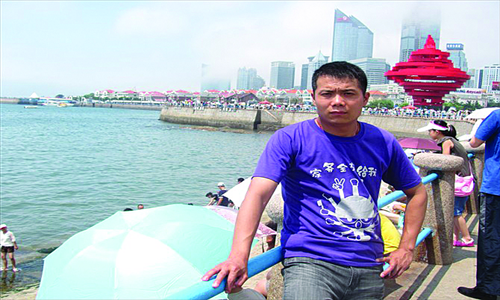The good fight

Zhang Haichao, who made headlines three years ago when he underwent open-chest surgery to prove he had an occupation-related lung disease, has recently come under the media spotlight again.
In early December, about 30 media outlets received an e-mail from Zhang, in which he explained that despite rumors that he's living the high life on the compensation he received, his quality of life is not very good, and that the local authority had canceled his family's subsistence allowance, which he suspected was an act of revenge. Before signing off, he made a plea for someone to agree to adopt his daughter, now 6, should he pass away.
Looks can be deceiving
Zhang, 31, from a rural village in Xinmi, Central China's Henan Province, developed lung problems after working for three years at a local, privately owned company that manufactures fire-resistant materials, which hired him in 2004.
After failing to convince authorities that his illness was work related, in June 2009, he voluntarily underwent surgery to prove that he had pneumoconiosis, or black lung, widely known as an occupational disease. After media exposure, on September 16, 2009, the company and the government paid him 615,000 yuan ($98,700) in compensation, an unusually large sum compared to similar cases in China.
Zhang began to use the money to purchase items for his home, including a computer and a heating and cooling unit. In 2010, he took home a new car that cost more than 50,000 yuan. He also sends his daughter to a private school in downtown Xinmi, which costs about 15,000 yuan a year, though public school would be tuition-free.

To an outsider, it may look like Zhang's family lives a much happier and more comfortable life since his illness began. However, Zhang, who even has an iPhone, begs to differ.
"My lungs are severely damaged. I even have trouble when walking," he said. "To maintain proper lung function, I have to take various medications every day, which cost over 3,000 yuan each month." He also explained that the household items he bought either help extend his lifespan or facilitate his volunteer work helping others seek compensation for occupation-related diseases.
Zhang's marriage was even ruined by his disease, which was a source of alienation between him and his ex-wife. Last June, they divorced, and he won custody of their daughter on the condition that his wife not pay any maintenance fees.
But often, one misfortune never comes alone. Soon after, his father began losing his eyesight, and his mother had her gallbladder removed.
Today, Zhang has only half of the compensation from 2009 left, but he said he simply cannot cut any expenses. "There's nothing wrong with sending my daughter to private school. I want to give her the best education I can," he said, adding that the urban public schools in Xinmi only admit kids with urban hukou (household registration) and do not offer boarding services, which is also why he chose private school.
Warmth and indifference
Starting in 2009, the local government also began providing Zhang's five-member family with a modest sum to assist with living expenses - 144 yuan a month per person. But in March last year, it canceled the aid because Zhang's living condition was much better than the minimum living standard.
However, Zhang and his friends believe that the local authority revoked the funding as revenge for the fact that several local officials were removed as a result of his case three years ago.
Local officials denied any such scheme, saying they were just following the rules.
Zhang also attributed local authorities' "cool" attitude to the fact that the media was no longer following his story. "Before, the officials streamed into my home to express sympathy with various gifts," he recalled, adding that his daughter had mused that their gifts outnumbered the items in the local grocery store. "Since I got the compensation, no officials have come."
After the recent round of widespread media coverage, local officials offered to reinstate his family's subsidy, but Zhang refused. "I'd rather beg on the street in the future than receive their 'kindness' ever again," he wrote on his Tencent Weibo.
Volunteer relief
With about 136,000 followers on his microblog, Zhang constantly provides updates on the progress of cases he's helping with to seek justice for fellow victims of work-related diseases, and commenting and reposting news about corrupt officials as well as the struggles of ordinary people.
Since winning fame, he has received requests for help from people across the country. In the last three years, according to Zhang's calculation, he has met over 1,000 black lung patients and helped with over 100 cases, claiming a total of about 4 million yuan for the victims.
He has done all of it for free and pays for his own travel and lodging.
Zhong Chengsheng, a black lung victim from a poor family in Fujian Province, told the Global Times that he will always be grateful for Zhang. "A few days after I contacted Zhang, he came to see me. When he learned I was in debt, he even paid for my accommodation when he came with me to argue my case. He is really a good man," said Zhong.
With Zhang's help and media influence, Zhong finally managed to get official verification of his disease, a key step toward getting workman's compensation.
Hard options
Zhang spends nearly half his time traveling to help others in need, which, doctors say, increases his risk of infection. "I always tell my patients not go to public places," said Hao Fengtong, a chief physician of occupational diseases with Beijing Chaoyang Hospital. "Though pneumoconiosis is incurable, with proper treatment, quite a few patients can live to their 70s or 80s."
But Zhang said he could not imagine any other way of life.
"If I stay at home, there's nothing to do but sit in front of the computer. Doing something meaningful makes me happy and fulfilled," he said. According to Zhang, more than 20 of his former colleagues have died of black lung, and the lifespan for black lung victims caused by inhalation of silica dust is nine years on average.
"I have consulted several doctors and know my condition. It's an extravagant hope to live to my 70s," he said. "I'd rather live a quality life for one day than be confined to my bed, staring at the ceiling for 10 years."
Though his volunteer work has kept him away from home, Zhang's daughter is the most important thing in his life. Some people have already contacted Zhang about adopting her, and he said he will soon choose which family will take her after his death.
When asked to name his biggest wish, rather than seeing his daughter grow up, Zhang said he wanted to see strict law enforcement protecting the interests and rights of workers. "My daughter will understand me and what I did when she grows up."